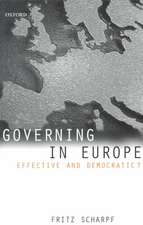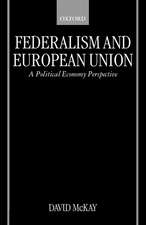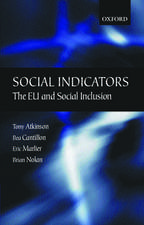EU Development Cooperation
en Limba Engleză Paperback – noi 2009
Preț: 220.34 lei
Nou
Puncte Express: 331
Preț estimativ în valută:
42.16€ • 45.09$ • 35.15£
42.16€ • 45.09$ • 35.15£
Carte tipărită la comandă
Livrare economică 18 aprilie-02 mai
Preluare comenzi: 021 569.72.76
Specificații
ISBN-13: 9780719062995
ISBN-10: 0719062993
Pagini: 156
Dimensiuni: 156 x 234 x 9 mm
Greutate: 0.25 kg
Editura: MANCHESTER UNIVERSITY PRESS
Locul publicării:United Kingdom
ISBN-10: 0719062993
Pagini: 156
Dimensiuni: 156 x 234 x 9 mm
Greutate: 0.25 kg
Editura: MANCHESTER UNIVERSITY PRESS
Locul publicării:United Kingdom
Notă biografică
Karin Arts is Associate Professor in International Law and Development at the Institute of Social Studies in The Hague, Netherlands. Anna K. Dickson is Lecturer in International Relations in the Politics Department of the University of Durham, UK
Cuprins
1. EU development cooperation, from model to symbol? - Karin Arts and Anna K. Dickson
2. From uniqueness to uniformity? An assessment of EU development aid policies - William Brown
3. The unimportance of trade preferences - Anna K. Dickson
4. The ACP in the European Union's network of regional relationships: Still unique or just one in the crowd? - Karen E. Smith
5. Changing european concerns: Security and complex political emergencies instead of development - Gorm Rye Olsen
6. Changing interests in EU development cooperation: The impact of EU membership and advancing integration - Karin Arts
7. 'Sense and sensibility': The role of France and French interests in European development policy since 1957 - Anne-Sophie Claeys
8. The commission and development policy: Bureaucratic politics in EU aid from the Lome Leap forward to the difficulties of adapting to the 21st century - Adrian Hewitt and Kaye Whiteman
9. Conclusions: The potential and limits of EU development cooperation policy - Karin Arts and Anna K. Dickson
Descriere
EU development cooperation policy has ceased to be unique and perhaps has become more symbolic than substantive. This book analyses the external and internal influencing factors which have contributed to the drastic changes to this policy.



















